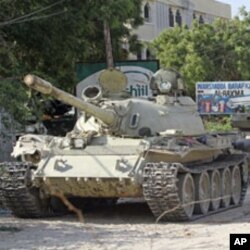Human Rights Watch has accused pro-government militias in Somalia of carrying out executions and other serious rights abuses in areas previously controlled by al-Shabab. The group said residents in “liberated” areas are now unsure of which side they can trust.
View Somalia in a larger map
In a new report released Thursday, Human Rights Watch said since Ethiopian troops and Somali militia groups ousted al-Shabab militants from the towns of Baidoa and Beletweyne, security has become worse.
According to the report, citizens said security forces sweeping the towns for al-Shabab remnants have executed or detained those they believe to be al-Shabab sympathizers.
Meantime, the al-Qaida linked group continues to launch deadly attacks targeting Ethiopian troops and the allied militias.
Laetitia Bader, a researcher with Human Rights Watch, said civilians are caught in the crossfire.
“Many of the people we spoke to, and I would say especially in Beletweyne, say that at the moment they are currently scared because they fear attacks from all sides, basically," Bader said. "And to a certain extent they said at least under al-Shabab we knew what to expect and how to act, but at the moment these attacks could come from any quarter.”
Human Rights Watch said the Shabelle Valley State militia (SVS) has been responsible for most of the abuses in Beletweyne.
In an incident in January, the report said SVS militia-members and Ethiopian forces arrested several people following an al-Shabab suicide bombing that damaged a building being used by Ethiopian forces.
Witnesses told the rights group that one of those detained, a teacher named Matan, was seized from his home and beaten; his body was recovered from a river several hours later after the group called his relatives to tell them where to find it.
In Baidoa last week, Human Rights Watch said an allied militia that came under attack from al-Shabab in a marketplace, responded by opening fire on a group of civilians, killing at least six people.
The militias taking over the newly “liberated” areas have the backing of Somalia's Transitional Federal Government (TFG) for their opposition to al-Shabab.
A TFG commander in Baidoa, Adan Ahmed Omar denied the allegations that militias are responsible for the abuses. He said the information is a lie, and lacks credibility.
“We don't kill people or torture people,” he said. “If someone is arrested, they are brought to court ... no one has been mistreated here.”
Omar told VOA that al-Shabab continues to launch attacks in Baidoa, and just recently assassinated a former TFG security official.
African Union and Kenyan forces in Somalia have also relied on these militias to keep the peace. Western powers in the international community have endorsed the idea of supporting local authorities to maintain law and order.
But Bader said there is still too little information about these groups and their intentions.
“We've been calling for a long time for the international community to really reinforce human rights monitoring on Somalia," said Bader. "There's a vacuum of information on who these actors are, and these actors who could potentially in the near future be receiving international support and this is very very concerning.”
Human Rights Watch has called on local authorities in Somalia to condemn wrong-doing and to investigate abuses by all groups.




